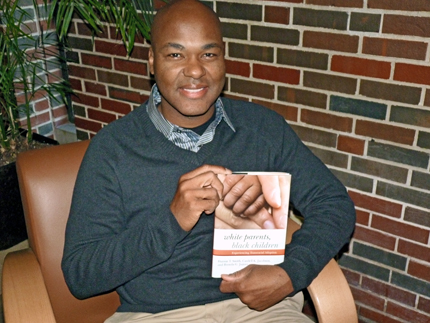This WSU Newsline Podcast is available at http://www.wichita.edu/newslinepodcast. See the transcript below:
You’re listening to the podcast edition of the Wichita State University audio newsline. Learn more about WSU on the Web at wichita.edu.
Love is not enough if you are a white parent of an adopted black child. That’s the premise behind Wichita State University assistant professor Darron T. Smith’s recently published book “White Parents, Black Children: Experiencing Transracial Adoption.” The book is based on Smith’s doctoral dissertation. Smith talks about one of the findings of his study.
Smith: “One of the main findings in the study was this idea from many white parents that race no longer exists, that racism is a thing of the past. And that was one of the more glaring findings in the study.”
Smith, an African American physician assistant in the College of Health Professions at Wichita State, authored the book with Cardell Jacobson, a professor of sociology at Brigham Young University. Smith explains why he wrote the book.
Smith: “The book was written in response to an African American student who was adopted — and she took my class at a university — and who was obviously confused about her racial identity.”
Results of the research didn’t surprise Smith.
Smith: “The research that was conducted on transracial adoption simply confirmed my suspicion that whites have a very nuanced idea about race, and that the research flushed that out and merely confirmed what I already knew.”
Smith says when white parents adopt minority children, they need to be aware of how race constitutes their children’s being.
Smith: “One of the challenges facing white parents who are raising black and biracial children is the continued belief that race doesn’t matter or race doesn’t exist for their children. That’s a mistake. White parents have to understand that race does matter, and they need to seek to understand race themselves in order to be better parents for their children.”
Smith offers some tips on what white parents of black or biracial children can do.
Smith: “I think it’d be helpful if white parents who are raising black and biracial children would essentially commit racial suicide. And what I mean by that, to clarify, is to move from their current predominantly white locations, increase their circle of friendships with people of color of equal status — that would be two major things that white parents can do right away.”
White parents mean well and love their children deeply. Still, Smith says, if they don’t attempt to widen their circle, even considering moving to an integrated neighborhood, they really shouldn’t adopt black children.
Smith: “I’m often asked in light of the research, am I for or against white parents adopting black children? It depends on the white parents and the degree to which they’re willing to do the difficult work of unlearning the racisms which reside within them whether they’re aware of it or not. If they do the hard work, then I’m all for it, and I think other child-care advocates would be for it as well. But it takes a special kind of white parent to do that, and currently I’m not sure if we have folks who are willing to do that kind of work.”
It’s never a question of love, said Smith. The issue is, can white parents sufficiently humble themselves and do better socially and culturally for their adopted children. Smith, whose research area is in minority health, said that in the book “White Parents, Black Children” he hopes to challenge the concept of a “colorblind” America and offer suggestions to help adoptees develop a healthy sense of self.
Thanks for listening. Until next time, this is Joe Kleinsasser for Wichita State University.


 Joe Kleinsasser
Joe Kleinsasser